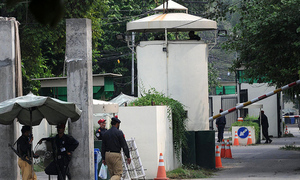ISLAMABAD: The Capital Development Authority (CDA) is in a fix over whether or not to allow the Saudi embassy to construct a multi-storey building in the Diplomatic Enclave on the pattern of the one raised by the United States (US).
The US embassy constructed the ground-plus seven storey building with the approval of the CDA given in 2012. However, objections are still being raised over the high-rise by different quarters.
The country’s premier intelligence agency in 2012 had expressed concerns over the high-rise saying it would overlook most of the buildings of ministries, and its rooftop could be used for surveillance of government premises.
According to documents available with Dawn, the Saudi embassy last year applied for the approval of its building plan for two basements and ground-plus nine-storey residential apartments.
The embassy recently started pursuing the case but the CDA officers are confused what to do. According to rules, ground-plus seven storeys were allowed in the Diplomatic Enclave but following the issue of the US embassy’s high-rise building the CDA board in 2012 decided to reduce the height of buildings in the area from ground-plus seven to ground-plus five. The reduction in height was, however, conditioned with the approval of the prime minister.
After construction of multi-storey US embassy, summary to reduce height of buildings in Diplomatic Enclave was sent to PM which is yet to be approved
In this regard, a summary was moved to the prime minister office on Aug 12, 2012, but it is still pending approval adding to the confusion of the civic agency.
“We are processing the request of the Saudi embassy and will deal with the matter in accordance with rules and regulations,” CDA spokesman Mazhar Hussain told Dawn.
“In 2012, the then CDA board had decided to allow ground-plus five subject to the approval of the prime minister. But we have not yet received a response to the summary from the prime minister office. So we are in a fix how to deal with the request of the Saudi embassy,” said Director Building Control Faisal Naeem.
He said the Saudi embassy’s representatives had expedited their efforts to get the building plan approved. “A few days ago, a representative of the embassy requested us to decide the matter,” he said.
A director of the CDA added that there was serious confusion in the case as the prevailing rules allowed ground-plus seven but the CDA board had revised the height of buildings to ground-plus five.
“There is no justification for the Saudi embassy’s request for two ground-plus nine storeys. We can’t grant approval for this but can think about ground-plus seven that too after getting an opinion from the law wing or the CDA board on the decision taken in 2012,” he said.
According to Saudi embassy’s application submitted to the CDA in March 2016, it wanted to construct two basements-plus seven-storey building for residential purposes.
“The CDA had allotted two acres for the construction of the Saudi embassy staff residential apartments in the Diplomatic Enclave vide its letter dated 11th September 2012,” read the letter.
It said building regulations of the CDA at the time of the allotment and handing over of the land to the embassy provided for two basements-plus ground-plus nine storeys.
Thereby, it added, the architectural design was conceived for the building. But the contractor has now been told that the CDA intended to amend the building regulations allowing two basements + ground +five storeys, the letter said, requesting the CDA to allow the building regulations that prevailed at the time of the allotment and handing over of the land to the embassy.
The construction of the US embassy building was also highlighted by the auditor general of Pakistan (AGP).
In a report submitted to parliament this year, the AGP said the CDA board in June 2012 had decided to increase the floor area of the building.
It had also decided that the number of storeys would be ground-plus seven.
The report said it was decided that before the implementation of the decision the case would be forwarded to the Cabinet Division for the approval of the prime minister.
The board had also decided to hold on the no-objection certificate (NOC) for the embassy building till a final decision by the prime minister.
The CDA summary forwarded to the prime minister in 2012 stated: “As a policy perspective, approval of the prime minister would be essential for the proposed changes in the building bylaws for Diplomatic Enclave in the longstanding national interest. The revised building byelaws 2012 would be enforced retrospectively with effect from January 2012 and revoke the previously approved building plans contrary to the provisions under the revised byelaws and nevertheless require/review/fresh approval of the existing building plans.”
Interestingly, the CDA as per its ordinance is supposed to formulate its bylaws to regulate buildings. In the past, the civic agency never sought approval of the prime minister for any changes to its building bylaws.

Comments
Post a Comment